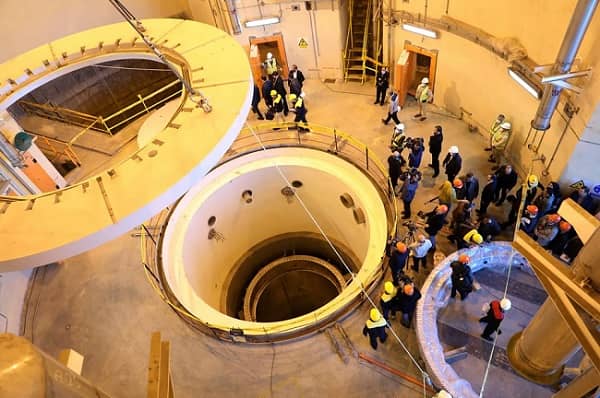Iranian Intelligence Minister Mahmoud Alavi admitted the regime’s desire to develop nuclear weapons earlier this month, something widely known by the international community, but often denied by the regime.
He said: “The fatwa [by Supreme Leader Ali Khamenei] forbids the production of nuclear weapons, but if they push Iran in those directions, it is not Iran’s fault. Those who pushed Iran in that direction will be to blame.”
Given this uncharacteristic admission, let’s look at how the regime never actually ended its nuclear weapons program despite signing and benefitting from the 2015 Joint Comprehensive Plan of Action (JCPOA) or nuclear deal.
What was the deal?
The JCPOA was designed to stop Iran from obtaining nuclear weapons and was signed by the P5+1 countries – the United States, United Kingdom, France, Russia, China, and Germany. However, it had plenty of loopholes and a short timeframe, allowing Iran to legally build a bomb in 2024.
In return for the halting of its nuclear deal, Iran would have international sanctions lifted; sanctions put in place after the Iranian Resistance exposed the regime’s nuclear activities beginning in 2002.
The regime had always denied any military reason for its nuclear program, which is a contrast to Alavi’s comments.
Has Iran been abiding by the deal?
No, according to the US when it pulled out of the deal in 2018 and regime officials who’ve admitted the continuation of the program.
Ali Akbar Salehi, the Head of Iran’s Atomic Energy Organization, said in January 2019 that the regime lied about filling the Arak reactor pipes with cement because they’d actually bought replacement pipes before signing the deal which were substituted in for the now broken ones.
He said: “During the nuclear negotiations. We said fine, we will pour them with cement. However, we never said we had other tubes because if we did [the P5+1] would say pour them with cement, too. And now we have these tubes.”
Later that year, Salehi said that the regime had accepted JCPOA articles because they could use loopholes to continue enriching uranium. This was made public months after the mullahs increased their stockpile of low-enriched uranium above the JCPOA limit of 300 kgs. (As of now, it is 3,600 kgs or enough for three bombs.)
The regime has also begun operating advanced centrifuges, according to the International Atomic Energy Agency (IAEA), and sped up its ballistic missile program.
The Iranian Resistance wrote: “The JCPOA has failed to deny either Iran’s capability or means of obtaining nuclear weapons. The regime’s nuclear infrastructure had remained intact. Thus, everything was left at the regime’s mercy… The re-imposition of six UN Security Council resolutions, the complete halt to enrichment, and the closure of all nuclear sites, as well as anytime, anywhere inspections are indispensable to prevent the ruling theocracy from acquiring nuclear weapons.”
